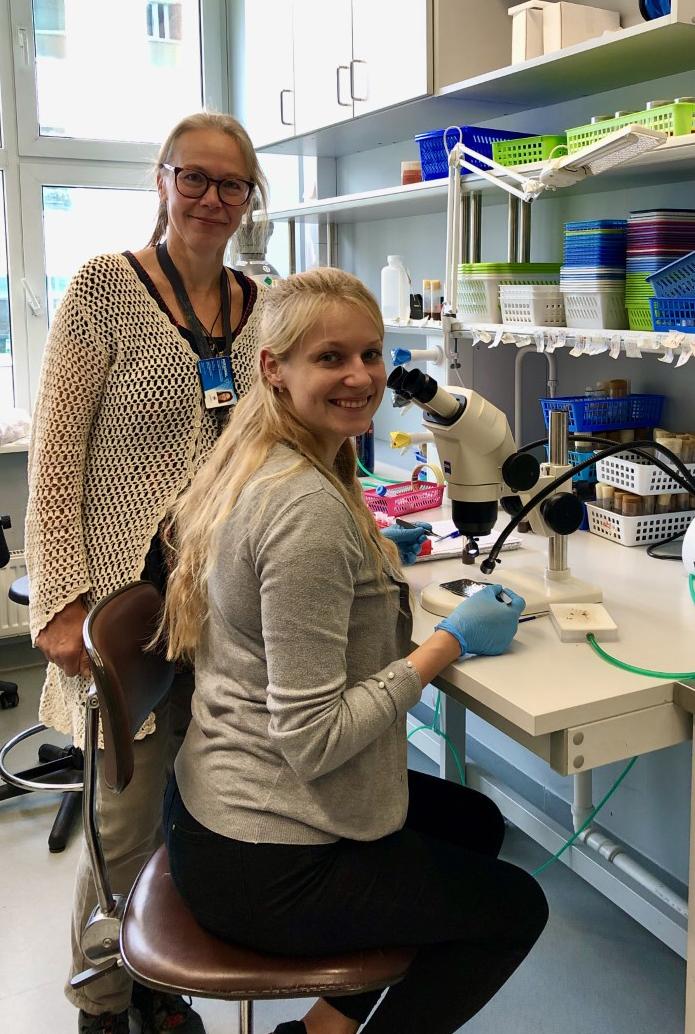
Credit: TalTech
The researchers from the TalTech molecular neurobiology laboratory headed by professor Tõnis Timmusk used the fruit fly, Drosophila melanogaster to develop a novel disease model for Pitt-Hopkins syndrome (PTHS). Their study was reported in the July issue of Disease Models and Mechanisms.
The PTHS syndrome is caused by mutations in one of the two copies of the TCF4 gene. PTHS patients suffer from moderate to severe intellectual disability: they typically will never learn how to speak. They also have severly imparied motor skills, including delayed acquisition of walking capability. There are around 500 cases documented all around the world, but because of the symptomatic similarity with other intellectual disability syndromes (Angelman, Rett etc.), the PTHS could be underdiagnosed.
75% of human genes known to be associated with diseases have their corresponding genes in the fruit fly genome, making Drosophila a widely used experimental system for modeling human diseases. The Drosophila counterpart of TCF4 gene is known as daughterless (da).
Researcher of molecular neurobiology laboratory Mari Palgi explains: “When we genetically reduced the amount of da gene product specifically in the learning and memory center of the fly brain, the animals exhibited defects of associative memory. Namely, they had lost the ability to associate specific odors with food availability. In addition, the locomotor skills of these fruit flies were impaired as revealed by a test known as the climbing assay. Next we aimed to enhance the activity of da in the mutants flies to restore both their learning and locomotor abilities, i.e to rescue the defective phenotype.”
First author of Article Laura Tamberg says: “We fed the mutant flies two different substances that had been shown to enhance the activity of TCF4 in a cell culture-based assay. We found that these substances were able to enhance the learning ability of compromised animals. In the climbing assay, the compromised flies’ regained the ability to climb upwards following administration of one compound. The rescue effect was more pronounced in female flies probably since they eat more to reproduce and had thus consumed more of the substances – which had been delivered with food. ”
Mari Palgi adds: “These findings suggest that these two substances could be potentially helpful for PTHS patients. One of these, resveratrol, is a food supplement found in number of foodstuffs, such as red grapes and blueberries, and the other one, SAHA, is a drug already in clinical use for treatment of certain lymphomas.”
Besides PTHS, commonly occurring variants of TCF4 gene have been associated with other psychiatric diseases such as schizophrenia and bipolar disorder. The authors’ Drosophila model could be used to study certain aspects of these diseases by measuring the changes in endophenotypes such as prepulse inhibition.
In the future it is feasible to use this Drosophila model in combination with two straightforward behavioral tests – associative learning and negative geotaxis assays – to screen for additional therapeutics for their ability to enhance the activity of TCF4.
###
Source: Disease Models and Mechanisms 30.07.2020 https:/
Additional information: Researcher of TalTech Neurobiology Laboratory Mari Palgi, [email protected]
Kersti Vähi, TalTechi Research Communications Officer
Media Contact
Mari Palgi
[email protected]
Related Journal Article
http://dx.




